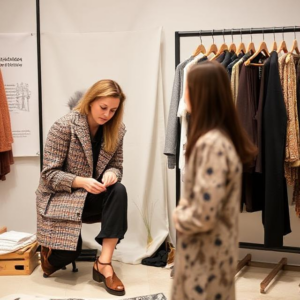 As the demand for eco-conscious products and sustainability continues to rise, the role of a Sustainable Fashion Advisor becomes increasingly important. This position would focus on guiding consumers and businesses alike toward more sustainable fashion choices, addressing the environmental and social challenges the industry faces. The advisor would play a critical role in helping individuals and brands transition to greener, more ethical alternatives without compromising style, quality, or functionality.
As the demand for eco-conscious products and sustainability continues to rise, the role of a Sustainable Fashion Advisor becomes increasingly important. This position would focus on guiding consumers and businesses alike toward more sustainable fashion choices, addressing the environmental and social challenges the industry faces. The advisor would play a critical role in helping individuals and brands transition to greener, more ethical alternatives without compromising style, quality, or functionality.
Key Responsibilities of a Sustainable Fashion Advisor:
- Consumer Education on Eco-Friendly Fashion
The advisor’s primary responsibility would be educating consumers about the environmental impact of fashion, including issues like overproduction, waste, and textile pollution. This involves explaining the benefits of choosing sustainable fabrics (such as organic cotton, hemp, or recycled polyester), supporting ethical brands, and embracing second-hand or upcycled clothing. The advisor would help consumers understand how to identify certifications like Fair Trade or GOTS (Global Organic Textile Standard) to make informed purchasing decisions - Curating Sustainable Wardrobes
A significant aspect of the role would be to help clients build sustainable wardrobes. This includes advising on how to mix and match eco-friendly pieces, prioritize versatile, long-lasting items, and opt for timeless designs that avoid the need for constant replacements. The advisor would also recommend brands and retailers who prioritize sustainability, offering options that align with the client’s personal style and values. - Brand Consultation and Strategy
For fashion brands looking to transition to more sustainable practices, a Sustainable Fashion Advisor would offer strategic advice on sourcing materials, adopting circular fashion models, and reducing waste. The advisor would assist in designing collections that use eco-friendly processes, such as slow fashion techniques, or focus on ethical production methods. This might also include helping brands implement take-back programs, where consumers can return worn clothing to be upcycled or recycled. - Promoting Clothing Care and Longevity

Teaching clients how to care for their clothing to extend its lifespan is another key responsibility. By educating consumers on proper washing, storing, and repairing techniques, advisors can help reduce the need for constant replacements, which is a significant contributor to fashion waste. Additionally, sustainable fashion advisors may recommend repair services or guide clients on how to DIY small fixes, such as sewing on buttons or patching up small tears. - Sustainable Styling Advice
The advisor would combine an understanding of fashion trends with a focus on sustainability, helping clients achieve modern, stylish looks using eco-friendly clothing. They would offer tips on how to create trendy outfits without falling into the trap of fast fashion or impulse buying. This includes showing how to integrate pre-loved, vintage, or sustainably made clothing into everyday looks.
Collaborations and Partnerships
A Sustainable Fashion Advisor might collaborate with other organizations and influencers to promote sustainability in fashion. This could include partnering with eco-friendly fashion events, advocating for sustainable policies, or creating awareness campaigns about fashion’s environmental impact. Advisors could also create partnerships with local tailors, upcycling businesses, or even charities to support sustainable practices in the community.

